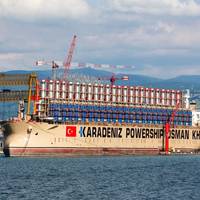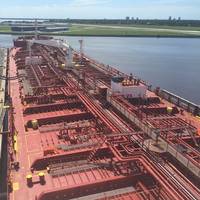Iranian Oil Remains Stuck Off US Coast
A cargo of sanctioned Iranian crude oil that was confiscated by the U.S. has sat off the Texas coast for eight weeks, unable to unload because commercial agents fear any vessel that takes it will be shunned by customers, people familiar with the matter said.Suez Rajan, a Marshall Islands-flagged tanker, has been anchored off Galveston, about 50 miles (80 km) outside of Houston, since May 30, with ship agents refusing to accept it. The Suezmax requires a lightering agent to transfer the crude to smaller ships, as its size and weight restrict it from directly entering the port.Shipping companies are worried that lightering the Iranian crude onto their vessels would lead other oil buyers to shun their ships on future voyages…
Cuba Seeks More Electricity Supply from Turkish Powerships

Cuba, mired in an energy crisis that has brought frequent blackouts, is negotiating with a Turkish company to have it double the megawatts it currently produces for the country from shipboard generators just offshore, according to two people with knowledge of the discussions.Cuban officials are in talks with Karpowership, one of the world’s largest operators of floating power plants and part of the Turkey-based Karadeniz Holding, the sources said. The company already has five…
US Says No Requests Yet to Waive Jones Act to Help Oil Companies

The U.S. government said on Monday it has not yet received requests to waive a 100-year-old law on shipping goods between domestic ports, despite some interested parties who say temporarily lifting the regulation would help energy companies hurt by the oil price plunge.Kelly Cahalan, a spokesperson at the U.S Customs and Border Protection agency of the Department of Homeland Security, said no requests to waive the Merchant Marine Act, better known as the Jones Act, have been received.U.S.
Waiting for the Windfall

The momentum for wind power continues to gather on the domestic waterfront. U.S. boatbuilders anxiously await the coming gale. "In a few instances, the Customs and Border Protection Agency (CBP), charged with administrating Jones Act applicability, has ruled that foreign vessels may engage in equipment installations on the Outer Continental Shelf. CBP could also determine that driving a pole into the sea bed constitutes a point in the U.S., therefore upholding Jones Act authority for point to point commerce. In the end, farm developers may build U.S.
U.S. Coast Guard Chooses Videotel on Demand

Videotel Marine International announced that the United States Coast Guard (USCG) in Yorktown, Virginia, which trains Port State Control Officers, has taken delivery of three Videotel on Demand (VOD) units. The units are pre-loaded with top quality marine safety and operational training videos, computer-based training materials (CBT) and instructional courses. Comprehensive and interactive, the training material will be used by the USCG to augment existing Port State Control Office training. "We are delighted to be supporting the USCG's efforts," said Nigel Cleave, CEO of Videotel.
IRS Focuses on Foreign Vessels Evaiding Taxes
The Offshore Marine Service Association (OMSA) applauded the Internal Revenue Service’s (IRS) recently posted directive to field officers establishing an issue management team in the wake of an IRS analysis indicating that a significant number of foreign vessels permitted to work in the U.S. offshore oil and gas industry aren’t complying with U.S. filing requirements. In the directive, posted last week on the IRS web site, Keith M. Jones, the IRS industry director of Natural Resources and Construction (NRC), noted that, “In recent years, an increased number of foreign vessels have applied to enter and work in the OCS (Outer Continental Shelf). Our analysis indicates that a significant number of foreign vessels permitted to work in the OCS do not comply with U.S.







